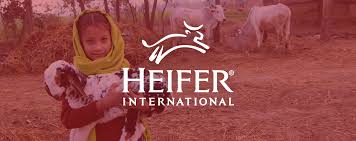Heifer International, a nonprofit organisation on a mission to end global hunger and poverty, has introduced the Area Yield Index Insurance (AYII) to Nigerian rice farmers as a solution to mitigate climate change-induced losses and restore investors’ confidence in rice farming.
AYII is used globally to ensure farmers get full returns if insured farmland does not produce the projected quantity of crops. It guarantees that farmers do not suffer loss, ensuring the sustainability of their agribusinesses and incomes. The scheme is being implemented in Nigeria by Heifer International in collaboration with three other organisations; PULA, OLAM and Leadway Assurance Limited, to cover the hazard shared by most farmers in the country.
“Constant exposure to unreliable weather conditions, new pests and diseases, cripple farmers’ businesses and discouraged agribusiness financiers and investors,” said Rufus Idris, Country Director of Heifer Nigeria. “Area Yield Index Insurance provides rice farmers in Nigeria with an affordable way to mitigate the impacts of climate change on their businesses.”
According to Climate Action Digest, Nigeria is the 55th most vulnerable country to climate change and 22nd least ready. Overall, climate change is projected to cost 6% – 30% of Nigeria’s GDP by 2050, translating to $100 billion – $460 billion in losses. In September 2020, farmers in northern Nigeria lost more than two million tons of rice, a quarter of the country’s projected harvest, due to flooding. Nigeria’s biggest rice producing state, Kebbi, projected 2.5 million tons in 2020, but heavier than expected rainfall washed away more than 1 million tons of rice from smallholder farms1.
According to research carried out by PULA in some African countries, AYII has helped smallholder farmers in countries facing climate change risks to increase their resilience to shocks, increase investment in their farms by 16%, improve yields by 56% and increase household savings by up to 170%.
“Most smallholder farmers in Nigeria see insurance as a burden without any benefits. When farmers are interested, the cost can be prohibitive, as they have to pay for it at the beginning of the farming season, when their limit funds are needed for inputs and preparing the land,” said Idris. “We believe insurance is an innovative financial solution that can increase the resilience of smallholder farmers in Nigeria. Designed by PULA and supported by Heifer International, the scheme will make farmers aware of the benefits of insurance and increase coverage, attracting more financiers to the sector to improve financial resilience for millions of farmers”.
The scheme is being implemented under Heifer’s Signature Program “Naija Unlock”, which aims to unlock Nigeria’s potential for food self-sufficiency and enable one million people to reach Sustainable Living Income by 2030 through strengthening local market systems and promoting innovative agribusiness models in the rice, tomato, and poultry value chains.
Heifer’s investment in pioneering the pay-at-harvest AYII among rice farmers in Nigeria will help increase farmers adoption of crop insurance and stimulate sustainable private sector investment in insurance and rice production. The insurance will be pre-financed, with smart rice farmers taking up the AYII coverage and paying it back at harvest when the off-taker buys back the rice produced. Farmers that experience poor harvests can recover their investments and pay-back their pre-financed AYII from insurance claim pay-outs.
Already, 4,358 smallholder rice farmers in Benue and Nasarawa states have benefited from pre-financed pay-at-harvest AYII for the 2021 wet farming season, with plans to support up to 10,000 farmers next farming season, and scale-up to 100,000 smallholder farmers by 2030. farmers that participated in the pre-financed pay-at-harvest AYII scheme during the 2021 drought, have a claim payout as a buffer for poor harvest experienced during that period.
“With climate change and adverse weather conditions playing a crucial role in negatively impacting farmer’s productivity and earnings, there’s never been a more critical time for AYII to create a soft-landing for farmers that need protection against nature’s uncertainty,” said Chukwuma Kalu, PULA’s Commercial Manager- West Africa Anglophone. “We remain dedicated to creating innovative insurance products that de-risk farmers’ agricultural investments and keep them above the poverty line, while driving farming sustainability across Nigeria.”
Reji George, Olam’s Vice President for Farming Initiatives added, “Olam is committed to supporting the growth of smallholder farmers that we do business with; hence, we are happy to be a part of this innovative solution that improves financial resiliency among Nigerian smallholder rice farmers”


